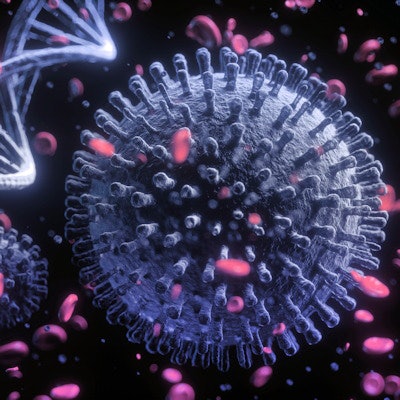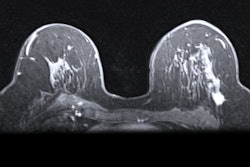
COVID-19 has dramatically affected breast imaging by delaying screening exams and affecting the mental health of breast imagers, according to an April 9 session at the Society of Breast Imaging (SBI)/American College of Radiology Breast Imaging Symposium.
Dr. Katerina Dodelzon of Weill Cornell at New York Presbyterian in New York City and Dr. Hannah Milch of the David Geffen School of Medicine at the University of California, Los Angeles shared findings from two surveys they conducted that assessed the pandemic's effect and which prompt important questions on how to move forward with patient care and breast imager resilience.
"Our [first] survey demonstrated the acute impact of COVID-19 has had on breast imaging in the U.S. -- with delays seen beyond screening mammography," Dodelzon said. "The delays were consistent with cancer care recommendations during the pandemic, but these recommendations were published in April 2020, and the prolonged duration of the pandemic wasn't anticipated. Now we need to ask ourselves whether both screening and diagnostic] patients have all now been seen, and consider the implications of delayed follow-up."
Delayed care
The first survey was a 21-question emailed effort that went out to 3,594 SBI and National Consortium of Breast Center (NCBC) members between June and July of last year. Of the total number of members invited, 473 responded for a response rate of 13%. Most of the survey participants were radiologists (83%), 18% were SBI members, and 48 of 50 U.S. states were represented.
Not surprisingly, the survey found that more than half (53%) of breast imaging facilities closed one or more sites, and 80% to 100% experienced a reduction in imaging volume, Dodelzon said. COVID-19 delayed screening mammography exams by 94%, ultrasound exams by 65%, and breast MRI exams by 65%.
When it came to diagnostic mammography, the most commonly postponed exams were those categorized as BI-RADS 3 (50%). Most survey respondents said their practices or departments continued to perform biopsies (97%), although scheduling varied depending on degree of suspicion of disease on mammography. Overall, private practices delayed a smaller percentage of breast cancer screening and diagnostic exams, biopsies, and localizations.
Dodelzon cited a study published on June 19, 2020, in Science that predicted at least 10,000 excess deaths from breast cancer will occur over the next decade due to the pandemic's effects on screening.
"Even that may be an underestimation, since it was projected very early in the pandemic," Dodelzon said. "The question is: Are we doing a good enough job getting patients back to screening and making up these missed appointments?"
COVID-19's gender effects
In a related survey distributed between June and September of 2020, Milch and colleagues explored the emotional impact of COVID-19 on breast imagers. This second survey consisted of 41 questions that explored topics such as mental health, childcare needs, finances, and patient care protocols. The researchers received 628 surveys, most of which were from SBI members. Most respondents were women and were radiologists.
Overall, the survey found the following:
- 68% of respondents reported feeling anxiety during the pandemic's peak.
- 44% reported layoffs or furloughs in their practice.
- 50% reported working for reduced hours or pay.
- 41% reported more financial strain compared to before the pandemic.
- 15% agreed or strongly agreed they were worried about losing their job. "This was almost double in women, at 17% compared to 9%," Milch noted.
The survey also highlighted the pandemic's disproportionate effect on women, according to Milch: 38% of survey respondents reported increased childcare needs, and of these, 40% were women. And when the researchers controlled for survey respondent factors, they found that being younger and being female were associated with higher psychological distress scores during the pandemic.
"We learned from this study that [female breast imagers] exhibited high levels of COVID-19-related psychological distress and that they were disproportionately affected by childcare burden," Milch said. "Even before the pandemic, women carry a higher childcare burden than men, and the pandemic has exacerbated this."
The pandemic could make the existing gender gap in radiology worse, particularly in terms of academic leadership and output, according to Milch.
"This disproportionate mental health and childcare burden on women threatens to widen existing gender disparities in radiology," she said. "[It's even more crucial to develop] proactive strategies to support, mentor, and sponsor female faculty and staff."




















